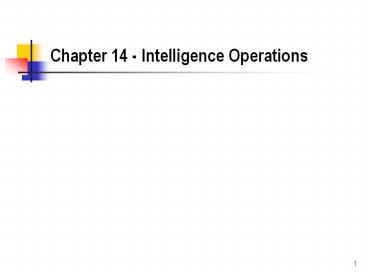Chapter 14 - Intelligence Operations PowerPoint PPT Presentation
Title: Chapter 14 - Intelligence Operations
1
Chapter 14 - Intelligence Operations
2
Why did the Intelligence Fail to Precipitate
Appropriate Action?
- Pearl Harbor - 1941 - The Japanese had already
bombed bases farther West in the Pacific. - Why didn't we move the ships out of the harbor?
- Bay of Pigs
- 4 American pilots and over 100 Cuban invaders
were killed in battle 1,400 Cuban invaders felt
betrayed by their sponsor One U.S. senator lied
to the United Nations One U.S. president was
embarrassed in front of the world April 1961 - Iran hostage crisis
- Should the CIA have figured out that letting the
Shah of Iran in was going to be trouble? - Should they have emptied the embassy?
- Is it failure of basic information? Analysis?
Strategic judgment?
3
Secrecy Policy
- What can the government keep secret and how far
can it go to do it? - What can the government do to collect
intelligence, both foreign and domestic? - How far can the government go with covert
operations as a tool of foreign policy? - What is the cost to domestic society as we
increase surveillance of citizens? - Is it a good idea to move from clearly separated
foreign/domestic and national/local surveillance
and policing to an integrated national
surveillance and policing system?
4
Keeping Secrets
- Did the founders anticipate that there would be
government secrets? - What about the constitutional convention itself?
- What did they think of legislative history?
- Was Congress allowed to keep its proceedings
secret? - What was the practice for executive branch
agencies until FOIA? - Why is congressional reporting a problem for
secrecy? - Why did Ford object to broadening reporting
requirements? - What can you do to a congressman who leaks info?
- What if Berkley elects a communist to Congress?
5
What are the INTs?
- human intelligence or espionage (HUMINT)
- imagery intelligence (IMINT)
- signals intelligence (SIGINT) and
- measurement and signatures intelligence (MASINT)
- Except for open-source intelligence (OSINT),
each of the INTs has a self-contained process,
from collection to delivery.
6
The Nature of Intelligence
- What is the stovepipe problem?
- What is the raw material of intelligence?
- What is the NSA getting when it scans a zillion
phone calls? - What do covert agents get in most cases?
- Why is it impossible to separate analysis from
intelligence? - Why is it impossible to separate politics and
bias from analysis? - What are the pros and cons of a single
intelligence service in terms of analysis?
7
Origin of the CIA
- What did the president do for intelligence before
World War II? - Was there a specific foreign intelligence
service? - What was the WWII agency that became the CIA?
- Why is the Central Intelligence Agency Act of
1949 seen as ratifying clandestine intelligence
gathering? - What does the NSA do?
8
Federal, State, Local Distinctions
- How is surveillance and policing done at the
state and local level? - Did all of these levels communicate effectively?
- Why could this be a problem?
- Why was this division seen as important to
protecting liberty? - Why do we elect sheriffs and judges, when their
jobs call for specific skills that elections do
not measure well? - What is are the risks of having a single agency
covering everything from foreign to local, under
a single executive branch secretary?
9
After 9/11
- What did the 9/11 commission recommend?
- Does this overturn the traditional division
between domestic and international intelligence? - Historically, who did national domestic
surveillance? - Who did foreign?
- Why were they divided?
- Does this division make sense?
10
Director of National Intelligence
- What is the Director of National Intelligence
added after 9/11? - Who does Director of National Intelligence
provide intelligence to? - What sources of intelligence does the Director of
National Intelligence have access to? - What is the relationship between the DNI and
heads of the NSA and the CIA? - What major source of info is missing from this
description? - What threat do these provisions pose?
11
Protecting Civil Liberties
- What is the Privacy and Civil Liberties Oversight
Board? - Who does it depend on for its powers?
- Why is this a problem?
12
Paying for the Intelligence Services
- What are the Political and Secrecy Issues in the
Intelligence Budget? - Why not give the agencies a blank check?
- Why is congressional oversight problematic?
13
What are the Three Priorities of the National
Security Strategy as stated in 2005?
- The top two mission objectives identified in
the Strategy are countering terrorism and halting
weapons proliferation. - The third listed objective is to bolster the
growth of democracy by having collectors,
analysts and operators within the intelligence
agencies seek to forge relationships with new
and incipient democracies in order to help
strengthen the rule of law and ward off threats
to representative government. - Why is the 3rd one problematic as a strategy?

